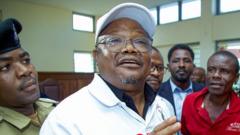As Tundu Lissu, the leader of Tanzania's main opposition party Chadema, grapples with treason charges and internal dissent, he continues to advocate for political reforms. In a challenging environment where previous elections have favored the ruling party, the effectiveness of Lissu’s confrontational approach remains uncertain, especially as the October elections draw near.
Tundu Lissu: The Struggle for Tanzanian Democracy Amidst Treason Charges

Tundu Lissu: The Struggle for Tanzanian Democracy Amidst Treason Charges
Facing treason charges and detention, opposition leader Tundu Lissu fights for reforms in Tanzania's political landscape, while assessing the impact of his strategies in the face of potential re-election for the ruling party.
In a defining moment for Tanzanian politics, Tundu Lissu, leader of the opposition party Chadema, finds himself embroiled in treason charges that could lead to the death penalty. Once dubbed the "great survivor" after surviving an assassination attempt in 2017, Lissu has emerged again as a central figure in the fight for political reform, despite being detained for the past two weeks.
The urgency of Lissu's call for reforms has grown as Chadema has been effectively disqualified from participating in the upcoming presidential and parliamentary elections scheduled for October. The party's refusal to sign a contentious code of conduct issued by the electoral commission has raised alarm bells about the government's intentions, suggesting a premeditated strategy to suppress opposition voices.
While Lissu remains undeterred, rallying his supporters with fervor—proclaiming "no reforms, no elections"—internal dissent within Chadema poses a significant challenge. Some factions within the party advocate for a more conciliatory approach, even aligning with the government's code, contrasting sharply with Lissu's aggressive tactics.
International observers, including Human Rights Watch and the Catholic Church, have echoed concerns about increasing political repression between Lissu's demands for a completely autonomous electoral commission and a transparent voting process. Despite claims from Prime Minister Kassim Majaliwa of ensuring fair elections, evidence of state violence against dissenters complicates the government narrative further.
Lissu is determined to continue mobilizing public support, drawing inspiration from regional movements, particularly in Kenya. However, with rising political tensions, including the recent abduction and murder of a Chadema official, many Tanzanians remain hesitant to engage openly in protests.
Political analysts have expressed skepticism regarding Lissu's strategy, pointing to time constraints with parliament set to conclude its term shortly. They argue that pushing for urgent reforms may yield little before the elections, while others contend that any sustained exclusion could weaken Chadema’s position as the leading opposition force, risking the influx of rival groups to fill the void.
As the countdown to the elections begins, the political landscape remains clouded with uncertainty. Tundu Lissu’s next steps could set the stage for either the continuation of Tanzania's political repression or a new chapter of transformative change. The world watches closely to see how this pivotal moment will shape Tanzania’s democratic future.
The urgency of Lissu's call for reforms has grown as Chadema has been effectively disqualified from participating in the upcoming presidential and parliamentary elections scheduled for October. The party's refusal to sign a contentious code of conduct issued by the electoral commission has raised alarm bells about the government's intentions, suggesting a premeditated strategy to suppress opposition voices.
While Lissu remains undeterred, rallying his supporters with fervor—proclaiming "no reforms, no elections"—internal dissent within Chadema poses a significant challenge. Some factions within the party advocate for a more conciliatory approach, even aligning with the government's code, contrasting sharply with Lissu's aggressive tactics.
International observers, including Human Rights Watch and the Catholic Church, have echoed concerns about increasing political repression between Lissu's demands for a completely autonomous electoral commission and a transparent voting process. Despite claims from Prime Minister Kassim Majaliwa of ensuring fair elections, evidence of state violence against dissenters complicates the government narrative further.
Lissu is determined to continue mobilizing public support, drawing inspiration from regional movements, particularly in Kenya. However, with rising political tensions, including the recent abduction and murder of a Chadema official, many Tanzanians remain hesitant to engage openly in protests.
Political analysts have expressed skepticism regarding Lissu's strategy, pointing to time constraints with parliament set to conclude its term shortly. They argue that pushing for urgent reforms may yield little before the elections, while others contend that any sustained exclusion could weaken Chadema’s position as the leading opposition force, risking the influx of rival groups to fill the void.
As the countdown to the elections begins, the political landscape remains clouded with uncertainty. Tundu Lissu’s next steps could set the stage for either the continuation of Tanzania's political repression or a new chapter of transformative change. The world watches closely to see how this pivotal moment will shape Tanzania’s democratic future.





















